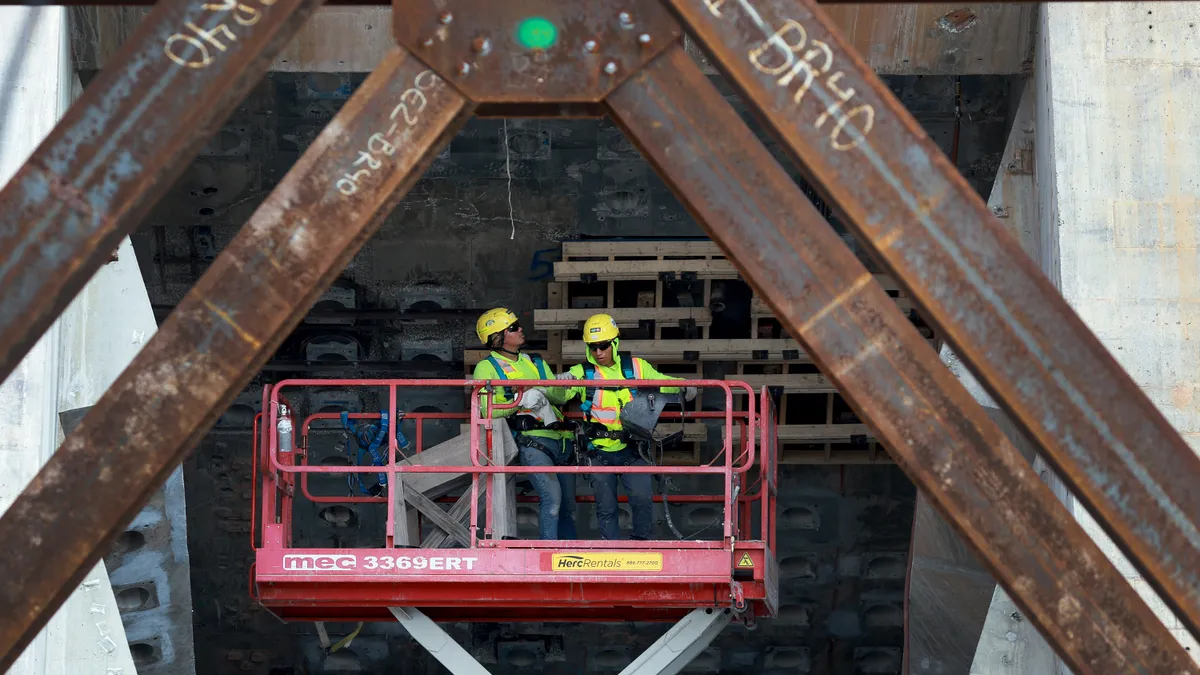As many as 2.1 million U.S. construction workers were misclassified or paid off the books in 2021, according to a new report from the Century Foundation, a progressive think tank and research group focused on equity in education, healthcare and work.
A Department of Labor rule change, effective March 11, will reverse a Trump-era shift and implement a new test for determining if a worker is an employee or independent contractor.
Laura Valle-Gutierrez, a fellow at New York City-based Century Foundation and one of the report’s authors, said she was excited to see the DOL’s rule change, which could help with the problem of misclassification, though more could still be done, she said.
“Additional changes like investing in enforcement and expanding joint and several liability are a few of the changes that are needed to truly curb the issue,” said Valle-Gutierrez.
Here, Valle-Gutierrez talks with Construction Dive, a sister publication to HR Dive, about her research and why misclassification isn’t just an issue for workers, but also for contractors looking to win work.
The following has been edited for brevity and clarity.
CONSTRUCTION DIVE: What is the major takeaway from your research?

Laura Valle-Gutierrez: The concept of worker misclassification isn't anything new. I think there's been decades of reporting and anecdotally, I think a lot of people know of people who are either paid off the books or treated as an independent contractor when they really shouldn't be. So, we went into this research wanting to really understand the extent of it, because one of the challenges with any underground economy is to know the extent. By nature, it’s not going to show up in data. It's trying to be hidden.
We wanted to know how many workers were being misclassified — wrongly labeled, paid off the books, denied their rights — but also what are the costs of this? Because I think the reason why this matters beyond just workers’ rights is the broader harm to individuals and companies.
We found up to 2.1 million construction workers are estimated to be misclassified or paid off the books, which is nearly 20% of the construction workforce. I think the scale of it is pretty striking.
How does worker misclassification affect contractors that play by the rules?
It's definitely an important question. I think, in construction like many other industries, labor costs are really a big line item in the budget. It's a big cost for employers, and that's obviously the reason why they are misclassifying workers or paying them off the books. It's a cost-saving mechanism for them. But it's also fraud.
One of the reasons why this is also harmful for other employers that aren't doing this is a law-abiding employer is going to be less competitive than someone who's able to cut their costs because they're paying their workers off the books. They're not paying for workers' comp or overtime or unemployment insurance taxes, none of those other things that the law-abiding employers are paying for. So it also just undermines the ability to have a competitive market and a level playing field.
Beyond the DOL rule change, what other policies should be reformed?
There's a few different things. This is both a state and federal issue. A lot of states — such as California and New Jersey — have passed “ABC” tests that just make it really easy to identify who should be an employee and who isn't an employee. And I think under any ABC test, we know that construction workers that are currently misclassified would count as employees.
So, I think that's one effort that is happening at the state level that could theoretically happen at the federal level; although, in practice it's unlikely that we're going to see something like that anytime soon.
States are also working on just expanding the pool of people held accountable for misclassifying by expanding things like joint employer liability, so that means that it's not just the subcontractor that is misclassifying the worker that's held accountable but also the primary contractor.
And then, obviously, enforcement is only as effective as the funding for those offices. So fully funding different agencies that are tasked with enforcement of these issues is important.
Joint liability isn’t the most popular policy. Do you think it would benefit both workers and companies?
Yeah, definitely. Obviously, from a worker perspective, it's going to make sure that workers have more protections, right? Because part of the issue is that it's really hard to figure out who is the person who hired this person and therefore is responsible for the misclassification, for the fraud.
I understand why a general contractor might be wary of that. But at the same time, as I said, curbing misclassification is going to level the playing field. This is just a practice that is so prevalent that it's hard to not engage. That's why it requires some of these maybe broader policy changes to address some of the problems that have become entrenched within the industry.
What else do you want people to know about this issue?
We have talked about the cost, but I think it's worth reemphasizing that misclassification costs workers directly in terms of losing access to their overtime pay or unemployment insurance.
But there are also these broader social costs: Costs to state governments, to our Social Security trust funds and our unemployment insurance trust funds that employers aren't having to pay into when they are misclassifying workers. And so these are broader costs to taxpayers that we talk about in our report that I think it's really important to understand.













